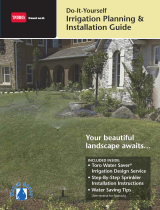Installation Guidelines
• Note the flow direction arrows on the bonnet or body and install accordingly
CAUTION: Using pipe dope on valve connections can cause thread damage and failure of the valve body.
Use only teflon tape or pipe thread sealant.
• The valve can be installed at any angle without af
fecting operation.
• The valve body plug and o-ring must be properly installed in the unused inlet.
•
•
W
aterproof wire splice connectors are absolutely essential for proper electric control system operation. Follow the installation
instructions provided with the connectors for optimum waterproof splice protection.
• Leaving a wire expansion loop at each valve location on long-run wire lengths is recommended.
Valve Operation and Adjustment
Flow Control
The flow control is used to reduce the flow and pressure to valve outlet. By turning the control handle clockwise, the flow will be
gradually reduced to zero.
• For valve models without EZReg, adjust the flow control as necessary for optimum sprinkler performance.
• For valve models with EZReg, the flow control should remain in the fully open position. Use only for emergency shut off or
for valve zone fine tuning.
Internal Manual Bleed Knob
The internal manual bleed system is used to manually operate the
valve. Turning the internal bleed knob (located beneath the solenoid)
counterclockwise allows water to bleed downstream from the
diaphragm chamber. Internal pressure is relieved from the top of the
diaphragm, allowing the valve to open. Turning the bleed knob
clockwise until tight shuts off the discharge enabling pressure to
build within the diaphragm chamber, causing the valve to close.
External Manual Bleed Knob (flush mode)
The external manual bleed knob, located on top of the flow control
handle, is used for system flushing. Turning this knob
counterclockwise allows water in the diaphragm chamber to vent to
atmosphere, creating maximum opening power and debris flushing
action. This operation bypasses the regulator (if installed) and opens
the valve fully, regardless of regulator setting. In addition, the
metering rod (attached to the external bleed knob) can be easily
removed for cleaning as necessary.
EZReg Adjustment (pressure regulating models only)
An accurate, adjustable dial, coupled with a forward-flow valve design, allows the P-220 series valve with EZReg to regulate
downstream water pressure with precision. It’s easy and simple to use and requires only 10 PSI differential pressure to
operate. The EZReg will operate during powered and manual valve operation using internal manual bleed.
To adjust the downstream pressure, remove the cover from the regulator dial, then turn the dial until the pointer is on the
desired pressure of 5-30 PSI (EZR-30) or 5-100 PSI (EZR-100).
Note: Due to the micro-adjustment feature of the EZReg, the dial requires 10 revolutions for complete regulation range.
Operate the valve (electrically or manually). Check the flow control to confirm that it is in the fully open position. Adjust the
regulator dial if necessary for optimum sprinkler operation.
To confirm the downstream pressure using a pressure gauge, remove the cap from the Schrader-type valve located directly
below the EZReg. Attach a Toro pressure gauge (Model 995-51) to the Schrader-type valve for a direct reading. Adjust the
EZReg dial as necessary for the desired pressure.
Note: The valve will remain watertight in the closed position if removal of the EZReg assembly is required.
© 2004 The Toro Company, Irrigation Division Form Number 373-0102 Rev. B
External Manual
Bleed Knob
Flow Control
Knob
Internal Manual
Bleed Knob
Spare Bonnet
Nut
EZReg
Schrader
V
alve
Figure 1
Use direct-burial wire, utilizing different color codes for each station control wire and one color for the common wire to all valves.




